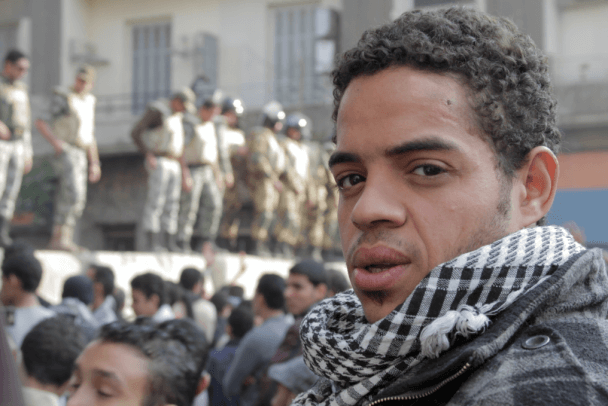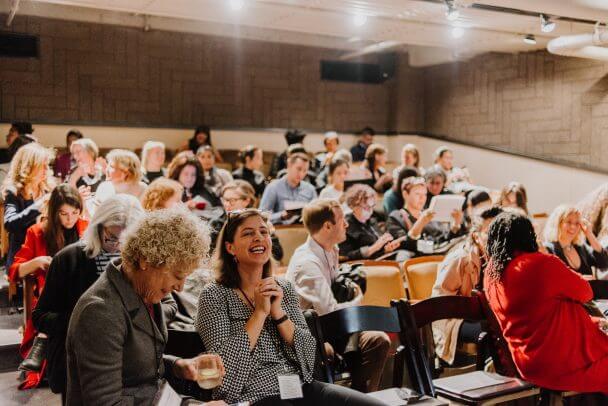Four Nest-supported Films at the 2018 Full Frame Documentary Film Festival
The annual Full Frame Documentary Film Festival will feature four Chicken & Egg-supported films this year! Held in Durham, North Carolina, the festival attracts filmmakers and film lovers from all over the world, creating a dynamic and culturally diverse experience for all involved.
The festival will run from April 5-8. Check out the entire list of films here. Purchase individual screening tickets here.
Dark Money, directed by Kimberly Reed (2018 Discretionary Grant Recipient)
A century ago, corrupt money swamped Montana’s legislature, but Montanans rose up to prohibit corporate campaign contributions. Today, in the wake of the Supreme Court’s Citizens United decision—which allows unlimited, anonymous money to pour into elections nationwide—Montana is once again fighting to preserve open and honest elections. Following an investigative reporter through a political thriller, Dark Money exposes one of the greatest threats to American democracy.
The Square, directed by Jehane Noujaim
A group of Egyptian revolutionaries battle leaders and regimes, risking their lives to build a new society of conscience.
Kings of Pastry (2010 Celebration Award Recipient), directed by Chris Hegedus and D A Pennebaker
On Her Shoulders directed by Alexandria Bombach (2018 SXSW LUNA / Chicken & Egg Pictures Award recipient)
***
Chicken & Egg Pictures also wants to give a special shout-out to the following films by Nest-supported filmmakers whose latest films will also be featured at the 2018 Full Frame Documentary Film Festival!
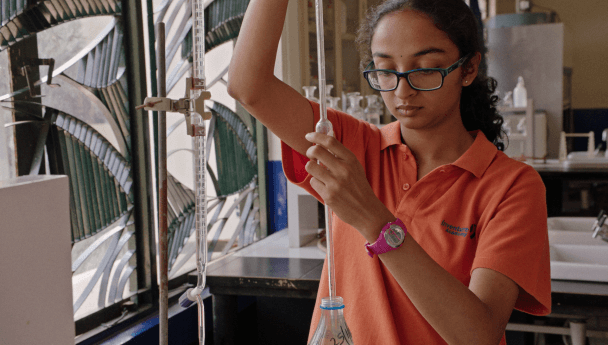
Capturing the Flag directed by Anne de Mare (director of the Nest-supported film, The Homestretch)
Control Room directed by Jehane Noujaim (director of the Nest-supported film, The Square)
Rafea: Sola Mama directed by Jehane Noujaim and Mona Eldaeif
Startup.com directed by Chris Hegedus (2010 Celebration Award recipient) and Jehane Noujaim
The Pushouts directed by Katie Galloway (director of the Nest-supported film, The Return)
Inventing Tomorrow directed by Laura Nix (2018 Breakthrough Filmmaker Award Recipient)
This Is Home directed by Alexandra Shiva (Chicken & Egg Pictures Board of Directors)
The Unafraid directed by Heather Courtney and Anayansi Prado (2017 Chicken & Egg Pictures mentee)
Post by 2018 Spring Programs Intern Dinayuri Rodriguez.
Chicken & Egg Pictures announces new Diversity Fellows Initiative, sponsored by The Harnisch Foundation
Chicken & Egg Pictures announced today the launch of the Diversity Fellows Initiative, a new program that supports seven non-fiction projects helmed by first or second-time women filmmakers. The Diversity Fellows Initiative is supported by The Harnisch Foundation, and will bring together participants for six months of tailored mentorship, workshops, and programming with Chicken & Egg Pictures staff.
This inaugural year of the Diversity Fellows Initiative features a partnership with DOC NYC, the largest documentary film festival in the United States, which includes an educational conference for filmmakers called DOC NYC PRO.
With Creative Partner Chicken & Egg Pictures, DOC NYC has created “Breaking In: New Roadmaps,” an entire day dedicated to diversity at the festival, which is co-presented with The City of New York Mayor’s Office of Media and Entertainment, and will take place on Thursday, November 19. The day features a full lineup of panels dedicated to exploring where diverse voices and emerging talent can get access to funding and mentorship, as well as develop their careers and artistic voice.
“Chicken & Egg Pictures is committed to discovering and elevating underrepresented voices in documentary filmmaking,” said Executive Director Jenni Wolfson. “We are thrilled to be able to support these nine exceptional filmmakers through our Diversity Fellows Initiative, sponsored by The Harnisch Foundation. We’re equally thrilled that The City of New York Mayor’s Office of Media and Entertainment will be joining us as a co-presenter of “Breaking In: New Roadmaps” at DOC NYC, which will share important best practices and resources for emerging artists of diverse backgrounds.”
“The Mayor’s Office of Media and Entertainment is committed to supporting opportunities for New Yorkers of all backgrounds to build meaningful careers in the media and entertainment industry,” said MOME Acting Commissioner Luis Castro. “New York is home to a talented and diverse community of artists. We are proud to partner with Chicken & Egg Pictures and DOC NYC to present “Breaking In: New Roadmaps.” This day long series will provide invaluable insights to help up-and-coming storytellers forge and grow their careers as well as foster opportunities for diverse artists to create and share their stories.”
Acting Commissioner Castro will help kick off the day with a panel about breaking into filmmaking. The panel includes veteran filmmakers Farihah Zaman (Remote Area Medical), Hao Wu (The Road to Fame) Yoruba Richen (The New Black) and Taj Paxton (Logo/Viacom), sharing lessons learned and advice on how to sustain their creative careers. Additional “Breaking In” panels will be featured throughout Thursday.
Fellows were chosen from over 400 applications to the Accelerator Lab for first and second-time women filmmakers, and received travel grants and stipends, which enabled them to come to New York and participate in Chicken & Egg Pictures’ signature story workshop, led by Creative Director Judith Helfand and Interim Creative Director Yvonne Welbon. As part of this workshop, they will receive personalized follow-up over the next six months to mark progress and receive feedback.
In addition to travel grants and stipends, fellows received an Industry Pass to DOC NYC, moving the filmmakers forward in their careers, enabling them a greater chance of finishing better films, and putting them in a stronger position when they apply for funding from other organizations. Participants also benefit from meeting and making connections with key industry professionals at DOC NYC.
THE CHICKEN & EGG PICTURES DIVERSITY FELLOWS: 2015-2016
BOUGHT, SOLD & RETURNED Director: Christina Birkhead – New York
Bought, Sold & Returned is a revealing look into the human trafficking epidemic in Vietnam. The film follows multiple Vietnamese girls who bravely faced impossible odds to make it home after being sold, as they emotionally heal and attempt to regain honorable futures. This delicate film confronts the root causes of human trafficking in Vietnam and highlights shelter and reintegration services enabling many young women to regain their lives after escape.
FLUSH REVOLUTION
Director: Lily Zepeda – Los Angeles
Flush Revolution follows Jack Sim, AKA “Mr. Toilet,” a Singaporean entrepreneur turned social activist who faces impossible odds doing work that others won’t: re-imagining and rebuilding the toilet. Although he has gained global recognition for his work with the UN and the World Toilet Organization, he must make endless sacrifices with no paycheck and a staff of nine to get 2.4 billion people access to safe sanitation. As Mr. Toilet partners with an army of celebrities and world leaders, time will tell if his passion and innovation are a match for India’s largest sanitation assignment in history.
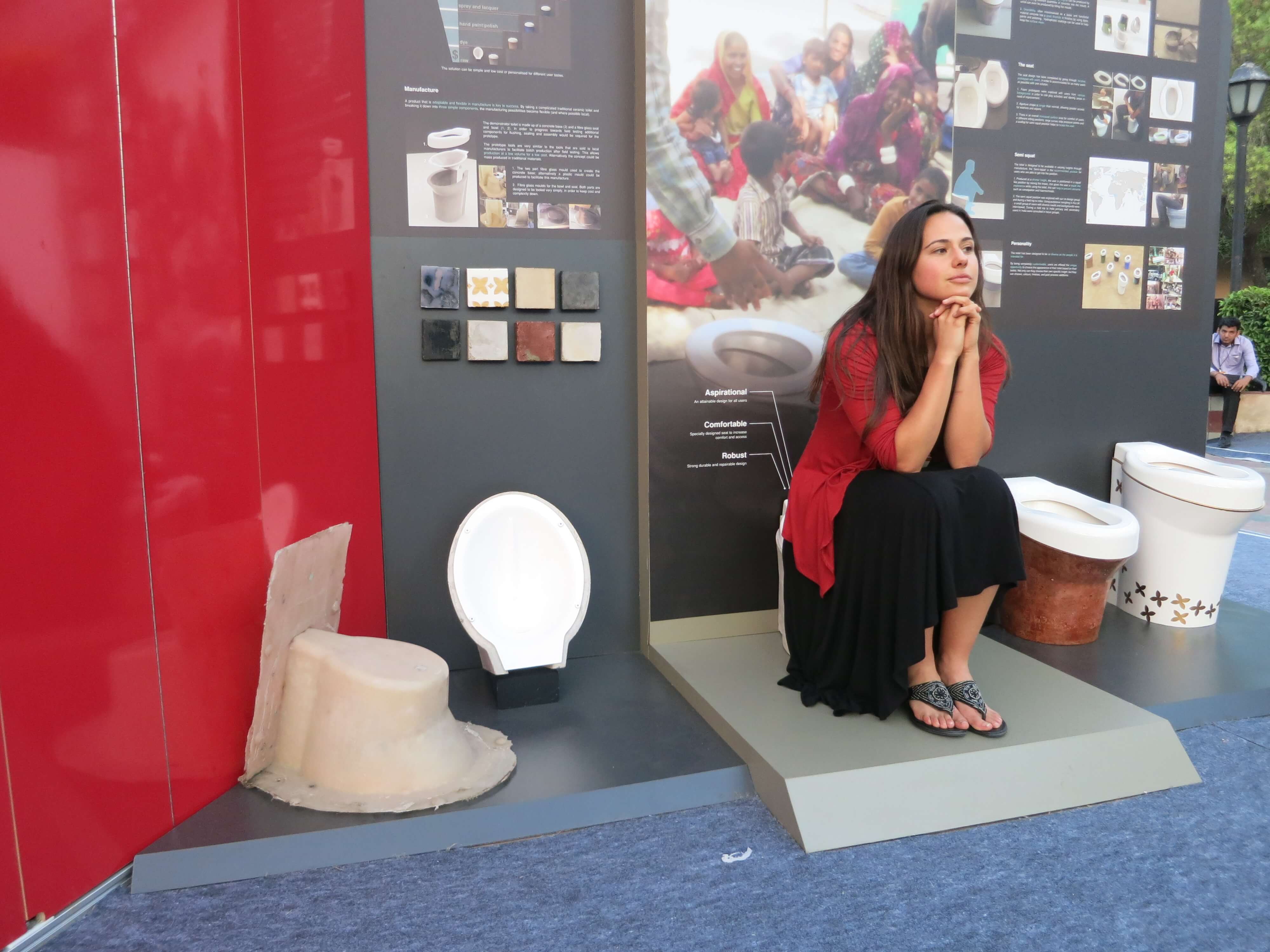
LADY TOWN
Directors: Siyan Liu & Danni Wang – New York
The bustling southern city of Dongguan is both the manufacturing hub and the sex capital of China. Most of the sex workers were once factory girls. Lady Town explores these two worlds through the lives of two struggling young women. This film follows two young Chinese women with high hopes. Yun, a young mother, wants to escape the crushing drudgery of factory work by starting her own business; while Jolin dreams of becoming an actress, instead of working in the sex industry.
OBSTINATE TO LIVE
Director: Sahra Mosawi – Afghanistan
In Afghanistan where systematic abuses of girls rarely come to light, and seeking justice can be deadly, one young woman says “Enough.” Her name is Khatera and this is her incredible story of love, hope, bravery, forgiveness and truth. It is also one of horrific abuse. Khatera was brutally raped by her father since the age of nine. Today she is twenty-three and raising two precious and precocious children—a daughter and a son—whom he sired.
RAJADA DALKA (NATION’S HOPE)
Director: Hana Mire — Abu Dhabi, United Arab Emirates
Rajada Dalka is a feature documentary that incarnates the strong will and devotion of the Somali Women National Basketball Team amid an ongoing conflict.
SWIMMING ON DRY LAND
Director: Michelle Sérieux – Kingston, Jamaica
Swimming on Dry Land examines the lives of young gay Jamaicans, at a time when the island is debating homosexuality publicly in politics, the press and in churches. The film’s title makes reference to the concept of “fish,” a term used in Jamaica to refer to homosexuals, but also references their marginalization, coupled with an equally strong determination by some of the characters to live and love in Jamaica, despite the odds.

UNITED SKATES
Directors: Dyana Winkler & Tina Brown- New York
United Skates follows an underground subculture growing inside our country’s last standing roller rinks. Fusing hip-hop with the speed of old school quad roller skates, this film shines a fresh light on the recurring pattern of racial struggle faced by African American artists, as it follows the next artistic movement still undiscovered by the American mainstream.
Unbeknownst even to the police, there are numerous public spaces across America that have been declared “neutral territory” by rivaling gangs. In the heart of South Central LA, Bloods and Crips put down their weapons each evening and peacefully coexist. These safe havens are found inside the faded walls of our country’s last remaining roller rinks where an underground social and artistic movement is growing under the radar. It took nearly thirty years for mainstream America to discover the brilliance of jazz. Similarly, the blues, R&B, and hip-hop were met with prejudice before being artistically recognized. United Skates will use the talent and fresh style of this world to shine a very different light on racial stereotyping through the eyes of an ex-Crip wife turned community activist, and a skater so determined to save what he loves, that he is about to lose his wife and children in the process.
Chicken & Egg Pictures announces grantees for inaugural Accelerator Lab
Chicken & Egg Pictures announced today the selected participants of the inaugural Accelerator Lab. The Accelerator Lab brings together 10 non-fiction projects helmed by first and second-time women filmmakers as part of a brand new program with the goal of providing the necessary tools and environment for talented filmmakers to tell their stories. The Accelerator Lab is focused on identifying a diverse group of first and second-time women non-fiction filmmakers and supporting their continued success through various means and initiatives.
These include providing financial assistance by way of grants, as well as creative guidance and support through mentorship workshops, industry connections, and peer support. Participants will receive a two-part grant for the production of their film, which they will develop over the course of the 12-18 month program.
“These filmmakers and projects represent a microcosm of the over 200 filmmakers whom Chicken & Egg Pictures has supported over the last ten years. Our goal is to nurture their talent by providing them with a yearlong creative lab program, a grant of up to $35,000, and a community of women filmmakers who can support and learn from one another,” said Jenni Wolfson, Executive Director of Chicken & Egg Pictures. “We selected these women filmmakers because we believe not only that they are going to make artful and compelling films, but because we believe that these stories must be told and will contribute to changing how we see and respond to the world around us.”
2015 ACCELERATOR LAB PARTICIPANTS:
A GUANGZHOU LOVE STORY
Director: Kathy Huang
In China, an unprecedented surge in African migration has led to a rise in marriages between Chinese women and African men. A Guangzhou Love Story captures the love, heartache, and real life challenges of Afro-Chinese couples attempting to forge a meaningful future together in the face of racism and xenophobia.

BY A THREAD
Director: Rina Castelnuovo & Tamir Elterman
By A Thread tells the story of Muhammad (Muhi), a Palestinian child from Gaza and the son of a Hamas activist wanted by Israel. As a newborn, Muhi is transferred to Israel for treatment of a life-threatening condition. Months turn into years and Muhi, now six, has lived his whole life in the Israeli hospital, confined for security reasons to its premises with his grandfather. The film explores Muhi’s contradictory world in which he is treated, raised, and saved by his people’s enemy, while his parents remain in Gaza.
By A Thread is an inside look at the Israeli-Palestinian conflict’s inescapable presence in everyday life and how it shapes those like Muhi who are unwillingly drawn into it.
CUENCA
Director: Isabel Alcántara
After a spate of mysterious illnesses and deaths, a community in Mexico discovers its water is radioactive. What unfolds is a story of resilience, conviction and the lies we tell ourselves about our dwindling resources.

FLY AWAY
Director: LC Cohen
Fly Away is a film about memory, identity, and growing up told through the eyes of seven siblings and their mother. Five of the children are on the autistic spectrum and as they move through adolescence, an event of the past keeps drawing them back. Combining observational footage with a rich archive of home movies and songs, the film is both a detective story and coming-of-age tale, exploring universal themes of memory, family, and love.
LAWYERS
Director: Hikaru Toda
A story of love, family, and rights, Lawyers is a snapshot of Japan in transition. Fumi and Kazu are life partners, both professionally and privately: they run the first and only law firm in Japan run by an openly gay couple. From activists to artists to vulnerable young people, we see a cross section of Japanese society pass through Kazu and Fumi’s office – their clients and their cases reveal Japan’s changing social landscape and the diversity too often overlooked in its homogenous society. Lawyers also follows Kazu and Fumi’s quest to raise a family. Faced with a legal system that doesn’t allow adoption by same sex couples and having seen firsthand the realities of institutionalized youths, they have begun the process of registering as foster parents.
ROLL RED ROLL
Director: Nancy Schwartzman
The story of a football town divided, Roll Red Roll is a true crime thriller examining sexual assault in small town America.
RULES TO LIVE BY
Director: Hope Litoff
A reflection on the life and suicide of Ruth Litoff, a successful artist, a pathological liar, and the filmmaker’s sister. By looking back on Ruth’s incredible highs and lows, bursts of creative genius, depression, secrets, and lies, a vivid portrait will emerge of the brilliant woman the filmmaker is not sure she ever really knew. This is her attempt to understand what happened.
SONS AND DAUGHTERS OF THE INCARCERATED
Director: Denali Tiller
Growing up is full of challenges, but for Tre, Maison, and Giana those challenges reach beyond friends, school, and middle school crushes. Sons and Daughters of the Incarcerated tells the story of three children whose fathers are in prison, and a formerly incarcerated mother who is now working to stop the cycle. How do the stigmas of incarceration shape their identities as they struggle to find their places in their communities and the world? What will it take to break the cycle of violence, crime, and imprisonment that pulls so hard on these kids’ lives and millions more like them?
THE FEELING OF BEING WATCHED
Director: Assia Boundaoui & Alex Bushe
The Feeling of Being Watched is the first documentary film to tell the story of the War on Terror from the perspective inside an Arab-American neighborhood. Since the early 90’s, people in Bridgeview, IL have stayed quiet about their deep suspicions of living under government surveillance, and no one has ever dug into why the surveillance may have begun. Until now. This film brings to light an under-represented human story and follows the filmmakers as they investigate what really happened, and may still be happening, in Bridgeview.
WHOSE STREETS?
Director: Sabaah Jordan & Damon Davis
A first-hand look at how the murder of one teenage boy became the last straw for a community under siege. Whose Streets? is a story of love, loss, conflict, and ambition; the journey of everyday people turned freedom fighters, whose lives intertwined with a burgeoning national movement for black liberation. This is a film for all of America – it provides insight into the unseen reality of racism, the role of media in conflict, state-sanctioned violence, and militarized policing – but at its core it is Ferguson’s story, it is our cry of “enough is enough.”
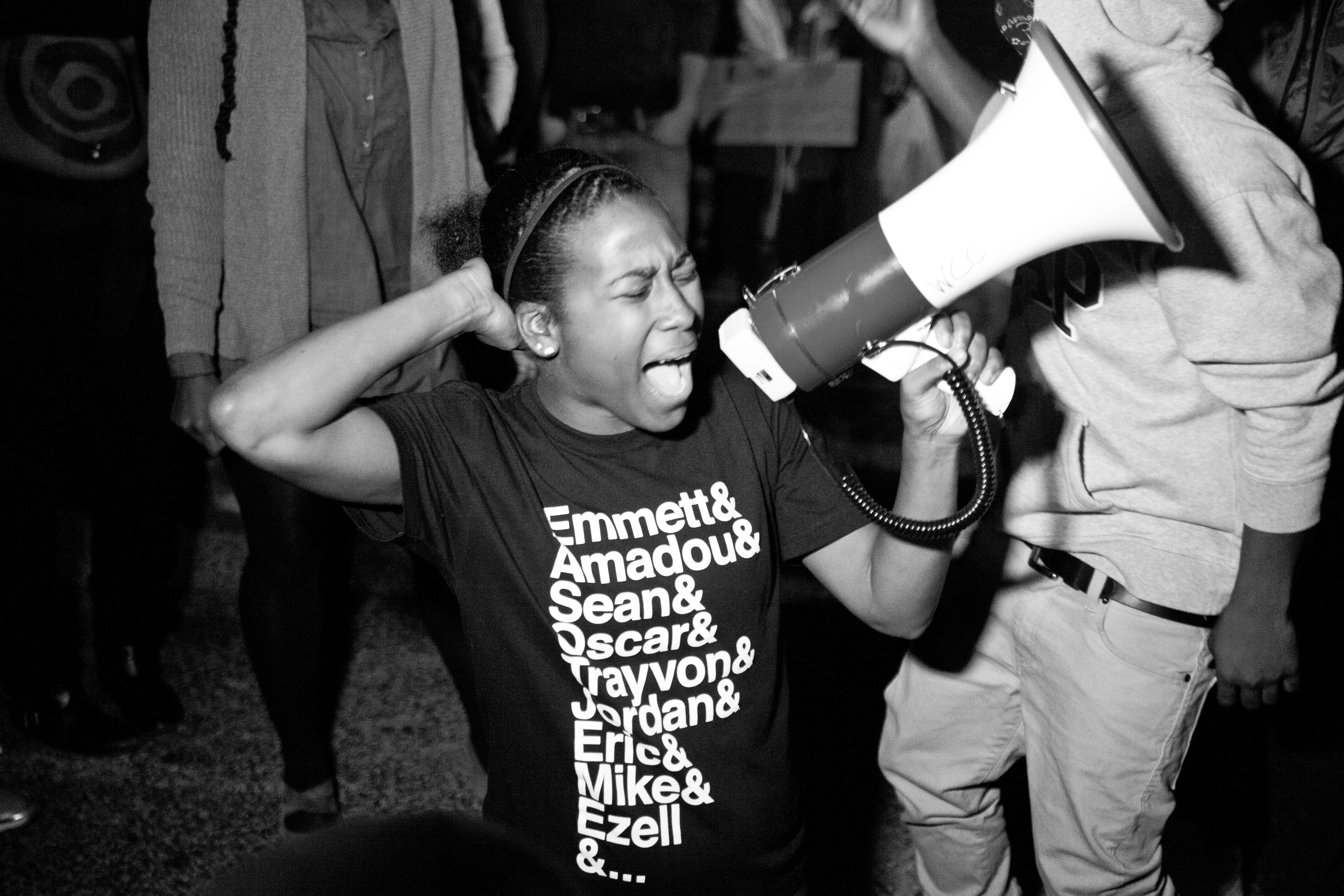
Program Manager Iyabo Boyd shares some last-minute tips for our 2015 Accelerator Lab Open Call
The deadline for the 2015 Accelerator Lab Open Call is fast approaching. Applications are due this Wednesday, June 10, 2015, by 5:00 PM EDT.
If you’re only just getting started on your application, don’t worry – we’ve compiled the below tips to help you get up to speed fast:
Overview: For those of you that want a full breakdown of this whole process, please review our Grants page and Frequently Asked Questions, both of which provide very helpful and thorough information. If you still have questions, please email info@chickeneggpics.org with your project title in the subject line.
Funding and mentorship: This Open Call for funding is the process that determines which films will be selected for our 2015 Accelerator Lab. If you are selected to receive a grant, you will also participate in the lab, which is a year long intensive mentorship program (with possibility for extension). It is not a goal of the lab for the films to be completed in that year; that is the length of time you’ll spend with us receiving mentorship. The lab will be structured around 3 to 4 retreats that the granted directors are required to attend, with travel support from us. The lab will be more intensive and tailored than our past mentorship programs, but if you want some insight on our mentorship style in general, take a look at our mentorship page or our blog.
First- or second- time filmmakers: When we say first- or second- time filmmaker, we’re talking specifically about your experience as a director or co-director of feature-length documentaries. You are still eligible if you’ve already made a few shorts, or done fiction work, we’re looking for directors who are making their first or second feature-length documentary. By feature length, we mean 40 minutes or more. Read more about this in our Frequently Asked Questions.
Early production: For this round, we’re only accepting projects between development and early-production (with no more than 40% of the footage shot) because we want to ensure that we have the greatest opportunity possible to make an impact on the film and on your development as the director. If you’re having trouble figuring out what percentage you’ve shot, think about the big picture of your finished film, where you are now, and what you need to do to get to that finished project. What do you have in the can, and how much more shooting do you think you have left to do? That’s how you’ll assess if you’ve reached the 40%. We’re not keeping count, but we hope you’ll respect the guidelines and be honest with yourself when considering applying.
Work samples: In a nutshell, the short work sample should grab our attention and show the project’s potential; the long work sample should give us a deeper sense of your directorial style, characters, and pacing of the film; and the prior work sample should tell us about your experience and your ability to follow through. The short and long samples should consist of pieces of the project with which you’re currently applying, whereas the prior work sample is from a different film you’ve worked on in the past.
No footage shot yet: We have a strict requirement of at least 7 minutes of footage for applicants. If you can, shoot something quickly before the deadline or maybe ask your subjects to shoot some verite or interview of themselves for you, but only if you think it will be good enough to represent your project in our review process. We do not accept unsolicited updates, so the application is the only opportunity for you to show us what you have. If it doesn’t seem you can get it all together before the deadline, it might not be the right time for you to apply for this round.
Parting shots: Here are a few last items to keep in mind:
-
- For this round we are not accepting interactive projects or series. Stay tuned for announcements on an upcoming program geared toward these formats in 2016. Join our mailing list, and follow us on Facebook and Twitter.
- If you’re unsure what makes a documentary a hybrid, check out this great article from the POV blog. Please also note that just because your film is based on a true story, that doesn’t mean it’s automatically a hybrid.
- For guidance on the written application, be sure to look at the help text on the right side of each question. Please also note that the word count for many of the essay based questions is 2300 characters, including spaces. Trust us, brief is better.
If you have any additional questions or concerns, send an email to info@chickeneggpics.org. Be sure to include the name of your project in the subject line.
Acing Your Q&A
Filmmaker discussions and Q&As are a great way for you to connect with the people who care about your film, and audiences love the chance to engage with you and discuss your film.
Glenn Raucher, Director of Theater Operations at the Film Society of Lincoln Center has seen countless film talkbacks; below, he and his staff shared with us stories of Q&A pros who used every possible chance to connect with their audience.
“John Waters, upon hearing that we were turning away 100+ people (!) from a stand-by line (sure to be disappointed, at best), offered to go out and greet them all, giving them a great experience, despite being turned away. Pedro Almodovar did the same before his ridiculously sold-out Amphitheater Talk” – Glenn Raucher, Director of Theater Operations.
“In 2002 Gary Sherman brought in his own print of “Deathline,” (uncut and very different from the theatrically released 1974 version that was re-titled “Raw Meat”). As a result, the audience got to see a version of the movie that had rarely, if ever, been shown in the United States. He was also patient and cooperative with the staff and his fans.” -Fletch Cossa, House Manager
“During a screening of “Jauja” in the New York Film Festival, the subtitling for the film failed momentarily, causing us to have to pause the film. Viggo Mortensen stood up, and cheerfully talked with the crowd while they waited, also communicating that…s**t happens, and it’s all good! It diffused the tension until the computer issue was fixed and the film resumed.” -Glenn Raucher, Director of Theater Operations
“Sacha Baron Cohen, in character as Borat, offered a “Brazilian” to everyone taking an elevator backstage with him, including our house manager. He was also, out of character, unfailingly friendly and polite.” -Karim Allick, House Manager
“A woman approached me and asked if I could help her convince Jean Dujardin to record a brief message of uplift for her very sick husband, a friend of the Film Society’s. Dujardin had flown in that day, and was clearly exhausted, but after a brief explanation, he said “of course!” and recorded a charming and funny get-well message.”- Glenn Raucher, Director of Theater Operations
These stories remind us that you don’t have to be a celebrity to make a great impression on your audience. House Manager Patrick Ng shares 3 overall tips to keep in mind for your Q&A:
- Keep your answers brief, unless you have an awesome anecdote to tell. This allows for more questions to be taken from the audience, and keeps the momentum moving. First time filmmakers tend to be more long winded in their responses, while the pros take the “less is more” approach. Short answers also provide the best quotes used in press and social media.
- Share your insight. People will remember your Q&A more when they can walk away with a nugget of insight that will inspire them, motivate them, make them look at something in a different way.
- Schedule permitting, make yourself available after the Q&A (in the lobby, not the theater!) to take more questions. A lot of people don’t feel comfortable asking a question in front of a full house and would prefer a more intimate circumstance.
Mentorship Selects: How to follow up
Programmers and executives from HBO, Candescent Films, POV, and IFP shared their favorite ways filmmakers follow up:
Re-introduce yourself and your project.
Send a short email with where we met and a one page sheet with all the info about your film.
If you send a link, make sure it’s downloadable and easily accessible.
If it can’t be downloaded for security reasons, explain and ask how many DVDs you should send. Make sure your link has a very easy password so people don’t get frustrated opening it.
Know when to give them some space.
Send another quick email if you don’t hear back but back away after 3 follow-up emails.
Be nice.
If you see the programmer or executive, be friendly. Don’t tell them they didn’t respond or remember you. If they can’t help you personally, they still can be a friend to the project by connecting you with other people who can help you, so keep the lines of communication open and courteous.
Mentorship Selects: How to give confident and compelling interviews
Many filmmakers prefer working behind the camera, not in front of it, but talking about your film on TV, radio, and on panels provides enormous exposure for your film and the issues it tackles. Filmmaker Jessica Devaney and publicist Adam Segal of The 2050 Group joined our New York mentorship to shed some light on media presentations and dispel some common fears around media interviews.
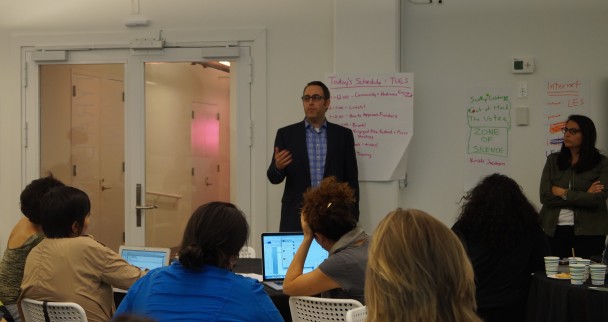
Here are their tips for giving your best media interviews:
Tell the story you want to tell.
Remember: as a filmmaker you are a storyteller, not a pundit. In media scenarios you are in charge of the story you present and you can direct the conversation toward what you want people to know about your film. Don’t just answer the questions. Ask yourself: what sentence do I need to say for this to be successful? Make sure you don’t get up till you say that sentence.
Be accessible.
Avoid jargon or overly technical vocabulary; don’t alienate your audience with big words or phrases they might not understand. Neutralize distracting physical tics like touching your hair or fiddling with jewelry.
Do your homework.
Talk to the producer and find out what they’re going to ask you. Look up when they last interviewed someone like you or talked with someone on your topic (via tracie). Observe what kinds of questions they asked or what angle they took.
Keep a cool head.
If you are a person who gets worked up, practice talking about hot button issues without losing your cool. If you make a mistake or say some wrong information, correct it before someone else does.
There’s strength in numbers.
If you want to take the focus off yourself, bring one of your subjects in the film with you.
Make sure your assets and materials are versatile.
Put together clips and assets that can be reused in different settings or shared in a different context.
Mentorship Selects: 7 tips for pitching your film
With the help and guidance of our guest experts and industry friends, we’ve put together this list of our 7 tips to keep in mind when you are pitching your film or project.
Practice, practice, practice.
Pitching is like a performance. If you’re prepared, you will feel and appear more relaxed.
Don’t repeat everything that is in your trailer.
Use every opportunity to share new information about your project.
Accept the feedback and any criticism you get.
Don’t waste time trying to argue; say thank you and hold back defensiveness.
Match your presentation to the tone of your film.
If it is a serious topic, reflect that in your voice. If it if it is light match that.
Let the images speak for themselves.
Explain the compelling story, not the style. It’s hard to explain style and tone.
Do your research.
Know who you are speaking with and familiarize yourself with their interests and passion issues. Take notes so that when they follow up with you, you can show growth.
Know the landscape.
If you pitch something that sounds like something a distributer has already done, immediately distinguish it. Be humble; don’t say “my film is better;” say that your film “builds on these others because…”
Mentorship Selects: Community screenings as a tool for engagement and impact
Caitlin Boyle of Film Sprout joined us to talk about how she sees community screenings as a vehicle for social change. She used her work on Diana Whitten’s film Vessel, a Chicken & Egg Pictures grantee and member of our Reel Reproductive Justice cohort, as a case study of how screenings can activate communities on an issue; in this case, abortion access.
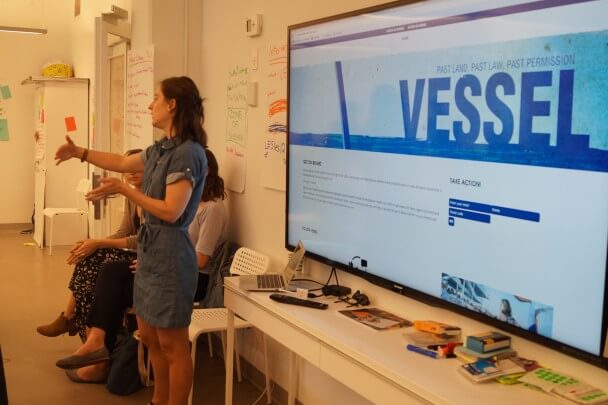
Here are her strategies for using community screenings to create engagement around your film:
The filmmaker and partners should set goals for what each screening should accomplish.
In some places, Vessel screenings collected ticket fees to fund abortion access, while in areas with limited or no abortion access, bringing the film for free was paramount.
Use the calendar to give the campaign an arc.
For the Vessel screenings, Caitlin utilized the Roe v. Wade anniversary and International Women’s Day to plan special events and incentivise screenings during those days.
Align metaphors in movie with engagement campaign.
For the Vessel screenings, the engagement campaign used metaphors like “going into uncharted waters” to market the events.
Think outside the fee.
Not every group can pay screening fees but you can barter free screenings for translations into other languages and retitling or subtitles, which will help the film reach more places.
Make sure engagement happens offline as well as online.
There was a large audience for Vessel in pro-choice 60-80 year olds who might not be on facebook or using email. Use digital platforms, but remember to make calls to reach your audience.
Survey screening hosts to get feedback, metrics and understand impact.
Send your survey a few weeks after and keep it short, about 15 questions.


